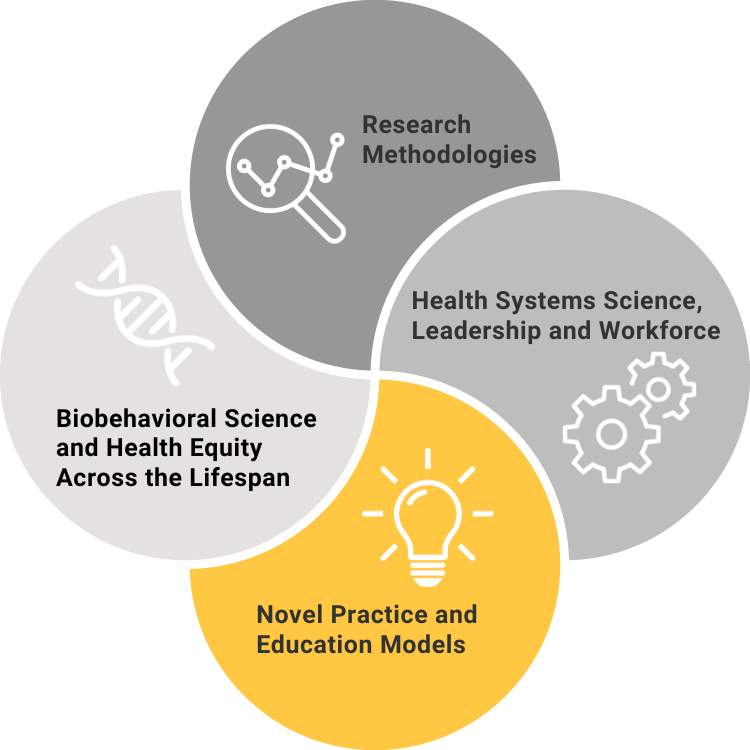Faculty Research and Scholarship Interests
Innovative research in health care, wellness, health equity, and education

Our faculty are exceptional educators equally committed to research and scholarship within the field of nursing and across interprofessional channels. Their passion for advancing knowledge, improving patient care, and promoting wellness is demonstrated by their work in wide-ranging areas of inquiry. From evidence-based nursing practice to community-based health research initiatives and nationwide multi-partner projects, our nurse scientists are making a real impact on the health and wellbeing of individuals and communities.
Our faculty engage in transdisciplinary team-based science as leaders of and collaborators in a multitude of funded projects. Our work leverages the talents and knowledge of individual nurse scientists while creating a collaborative environment that supports rapid discovery and innovative solutions. Our research spans the translational continuum: occurring at the laboratory bench, the bedside and in the community.
Learn more about the leading areas of research in the school and the faculty that support them below.
Biobehavioral Science and Health Equity Across the Lifespan
Research in this area focuses on understanding the complex interactions between biological, behavioral, psychological, social, and environmental factors that influence health and wellbeing across different stages of life. Many of our projects aim to understand underlying mechanisms that contribute to health disparities and inequities in various populations.
Research in this area focuses on understanding the causes of cancer, developing prevention strategies and advancing medical interventions to reduce the incidence of cancer, improve survival rates and enhance the quality of life for patients.
This area of research investigates the complex interactions between aging, chronic diseases and strategies for promoting health and wellbeing in older adults. Researchers on this team work on key areas such as brain health, cognitive frailty, mobility, preventing cognitive decline, Parkinson’s and neurodegenerative disorders, and kidney health.
This area of research investigates how various biological, environmental, social and behavioral factors interact to shape the trajectory of development and influence health outcomes during prenatal period through infancy and childhood.
This area of research explores the physical, mental, and emotional wellbeing of individuals along the parenting journey, from preconception through pregnancy, postpartum, and beyond. Of interest is the connection between parental health with the health and wellness of infants and families with a focus on historically marginalized communities.
This area of research is centered on the critical role of mental health in wellness across the lifespan. An understanding of how substance use and abuse relates to mental and physical health across the lifespan is a critical component of this work.
This is a multidisciplinary field that explores the health needs and experiences of individuals who identify as women and examines the impact of biological, social and cultural factors on health outcomes.
Health Systems Science, Leadership and Workforce
This area of research focuses on the organization, management and functioning of health care systems and the effects health systems leadership, management practices and organizational behavior have on patient care and the health care workforce.
Novel Practice and Education Models
Research in this area explores innovative teaching methods, curriculum development and assessment of nursing education programs in order to improve the quality of nursing education and prepare future nurses effectively.
Research Methodologies
This area refers to systematic processes and approaches used to design studies, gather relevant data and analyze various aspects of nursing practice, health care, patient outcomes and related topics. Our nurse scientists contribute expertise to teams regarding biostatistics, community-engaged research methodologies, qualitative and mixed-methods approaches, intervention research, psychometric testing, and sleep-assessment methodologies.